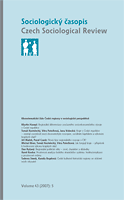Prostorová analýza českého stranického systému. Institucionalizace a prostorové režimy
Spatial Analysis of the Czech Party System. Institutionalisation and Spatial Regimes
Author(s): Karel KoubaSubject(s): Politics / Political Sciences
Published by: AV ČR - Akademie věd České republiky - Sociologický ústav
Keywords: Czech party system; spatial regimes; party system nationalisation; contextual effects; spatial regression model
Summary/Abstract: This article explores the spatial infl uences that shape the contemporary Czech party system and their consequences for the institutionalisation of the party system. First, the regionalisation of the party system is measured to identify the specifi c regional clusters of votes for individual parties. Second, after controlling for the impact of social cleavages, the independent effect of two macro-regions on the differences in voting decisions is analysed. In the case of Moravia, no such independent effect is evident. Conversely, in the formerly German-inhabited Sudetenland there is an effect on the vote in the case of two parties (KSČM and ODS). The historical reasons for this spatial regime are briefl y discussed. Finally, the relative insignifi cance of spatial regimes in the Czech party system is explained with reference to its high degree of nationalisation (the level of spatial heterogeneity in regional voting results). The author employs spatial analytical techniques in the article, such as measures of spatial autocorrelation, the spatial regression model, and the Gini Index. The fi ndings suggest that there is a high degree of spatial institutionalisation of the Czech party system and relatively insignifi cant contextual effects at the macro-regional level.
Journal: Sociologický časopis / Czech Sociological Review
- Issue Year: 43/2007
- Issue No: 05
- Page Range: 1117-1137
- Page Count: 21
- Language: Czech

